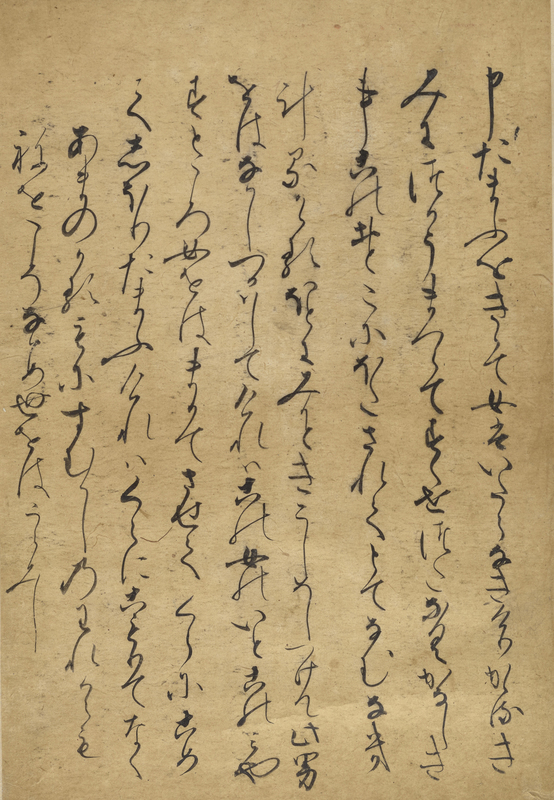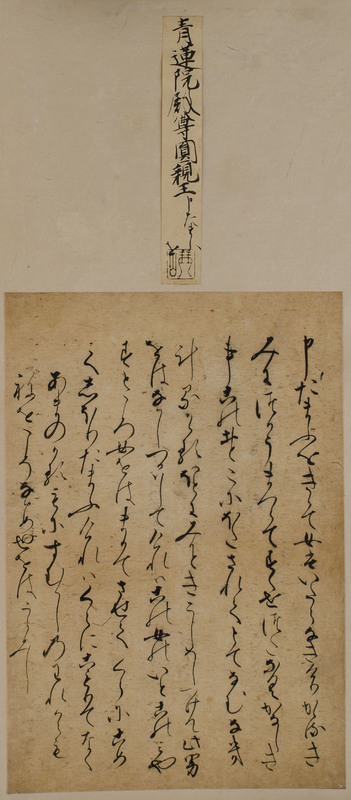290 An excerpt from Ise monogatari (The Tales of Ise), episode 65, "Ariwara narikeru otoko" (A Man Called Ariwara); opening word, "...mōshitamau o" (申たまふを)
Item
Title
290 An excerpt from Ise monogatari (The Tales of Ise), episode 65, "Ariwara narikeru otoko" (A Man Called Ariwara); opening word, "...mōshitamau o" (申たまふを)
Calligrapher
Attributed to Shōren-in Son'en (1298-1356)
Style/period
Kamakura (1192–1333) and Nanbokuchō/Muromachi (1333-1568)
Date
End of Kamakura-Nanbokuchō
Material
Calligraphy fragment; ink on paper
Measurements
23.9 x 16.2 cm
Identifier
Z42_4j3_123b_290
Item Locator
Z42.4 J3
Transcription
[この帝は、顔かたちよくおはしまして、仏の御名を御心に入れて、御声はいと尊くて] 申たまふをきゝて女はいたうなきけりかゝるき/みにつかうまつらでてすくせつたなくかなしき/事このをとこにほたされてとてなむなき/けるかゝるほとにみかときゝしめしつけて此男/をはなかしつかはしてけれはこの女のいとこのみや/すところ女をはまかてさせてくらにこめ/てしほりたまふけれはくらにこもりてなく/あまのかるもにすむゝしのわれからと/ねをこそなかめ世をはうらみし
Transliteration
Ise Monogatari 65
[kono mikado wa, kao katachi yoku owashimashite, hotoke no ona wo migokoro ni irete, okoe wa ito tōtokute] mōshi tamau wo kikite ona wa itō nakikeri kakaru kimi ni tsukau matsurade te sukuse tsutanaku kanashiki koto kono otoko ni hodasarete tote namu nakikeru kakaru hodo ni mikado kikishime tsukete kono otoko wo ba nagashi tsukawashite kereba kono ona no ito kono miyasudokoro ona wo ba makade sasete kura ni komete shiori tamau kereba kura ni komorite naku
ama no karumo ni / sumu mushi no ware / kara to oto / wo koso naki kame / yo wo ba uramiji
[kono mikado wa, kao katachi yoku owashimashite, hotoke no ona wo migokoro ni irete, okoe wa ito tōtokute] mōshi tamau wo kikite ona wa itō nakikeri kakaru kimi ni tsukau matsurade te sukuse tsutanaku kanashiki koto kono otoko ni hodasarete tote namu nakikeru kakaru hodo ni mikado kikishime tsukete kono otoko wo ba nagashi tsukawashite kereba kono ona no ito kono miyasudokoro ona wo ba makade sasete kura ni komete shiori tamau kereba kura ni komorite naku
ama no karumo ni / sumu mushi no ware / kara to oto / wo koso naki kame / yo wo ba uramiji
Translation
Ise Monogatari 65 The Young Love of Narihira
The emperor was splendid in both looks and figure. Listening to him chanting devoutly the Buddha’s name in his resonant voice moved the lady to bitter tears. She sobbed, ‘What cruel karma, to be bound as I am to that youth and so unable to serve His Majesty with all my heart.’ Eventually the emperor got wind of the affair and banished the youth. His mother expelled the lady from the palace, locked her up in a storehouse and gave her a good scolding. The imprisoned lady wept: It was indeed my own fault / I was caught like a skeleton shrimp / in seaweed gathered by fisherfolk. / So let me raise my voice and cry, / but blame no one but me. (MacMillan 2016, p. 209)
Ise Monogatari 65
The emperor was a most handsome man. Listening to him chant the sacred name of the Buddha with impressive reverence and dignity, the lady shed bitter tears. “What a cruel karma it is that binds me to someone else instead of letting me serve such a sovereign,” she sobbed. In time the emperor learned of the affair and banished the youth. The lady’s cousin, the emperor’s mother, made the lady leave the palace, and shut her up in a back room to punish her. The weeping lady composed this poem in her prison: I weep aloud / For my own fault, / Blaming no other. (McCullough 1968, p. 113)
The emperor was splendid in both looks and figure. Listening to him chanting devoutly the Buddha’s name in his resonant voice moved the lady to bitter tears. She sobbed, ‘What cruel karma, to be bound as I am to that youth and so unable to serve His Majesty with all my heart.’ Eventually the emperor got wind of the affair and banished the youth. His mother expelled the lady from the palace, locked her up in a storehouse and gave her a good scolding. The imprisoned lady wept: It was indeed my own fault / I was caught like a skeleton shrimp / in seaweed gathered by fisherfolk. / So let me raise my voice and cry, / but blame no one but me. (MacMillan 2016, p. 209)
Ise Monogatari 65
The emperor was a most handsome man. Listening to him chant the sacred name of the Buddha with impressive reverence and dignity, the lady shed bitter tears. “What a cruel karma it is that binds me to someone else instead of letting me serve such a sovereign,” she sobbed. In time the emperor learned of the affair and banished the youth. The lady’s cousin, the emperor’s mother, made the lady leave the palace, and shut her up in a back room to punish her. The weeping lady composed this poem in her prison: I weep aloud / For my own fault, / Blaming no other. (McCullough 1968, p. 113)
Description
Information on kiwame fuda (Identification/Authentication slip): 青蓮院殿尊圓親王 申たまふ/を
(極印)琴山
(筆跡)古筆家了珉(五代)か?)
(極印)琴山
(筆跡)古筆家了珉(五代)か?)
Attributed to Shōren-in-dono Son’en-shinnō; Authentication Seal: Kinzan; Authenticator: Kohitsu Ryōmin (Fifth generation head of the Kohitsu main lineage) (?)
First Line Height: 20.8 cm
Source
『伊勢物語』65「在原なりける男」この帝は、顔かたちよくおはしまして、仏の御名を御心に入れて、御声はいと尊くて申したまふを聞きて、女はいたう泣きけり。「かかる君に仕うまつらで、宿世つたなく、悲しきこと、この男にほだされて」とてなむ泣きける。かかるほどに、帝聞しめしつけて、この男をば流しつかはしてければ、この女のいとこの御息所、女をばまかでさせて、蔵にこめてしをりたまうければ、蔵にこもりて泣く。あまの刈る藻にすむ虫のわれからと音をこそ泣かめ世をば恨みじと泣きをれば、この男、人の国より夜ごとに来つつ、笛をいとおもしろく吹きて、声はをかしうてぞ、あはれにうたひける。かかれば、この女は蔵にこもりながら、それにぞあなるとは聞けど、あひ見るべきにもあらでなむありける。
Gertrude Bass Warner Memorial Library
Repository
University of Oregon. Libraries. Special Collections & University Archives
Institution
University of Oregon
Type
Image
Format
image/jpeg
Rights
No Copyright - United States
Rights Holder
University of Oregon. Libraries. Special Collections & University Archives

